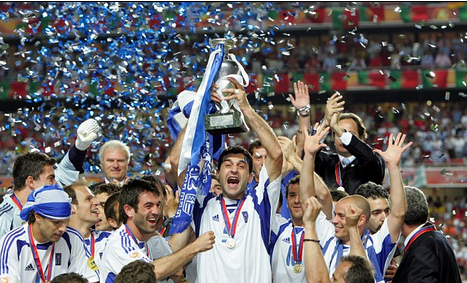男篮欧洲杯各队球员名单
731
2024 / 06 / 03
Title: How Did Greece Win the UEFA European Championship?
In 2004, Greece surprised the football world by winning the UEFA European Championship, commonly known as the Euro. Their unexpected victory was a result of several key factors that contributed to their success.
Defensive Organization and Discipline:
Greece's approach to the tournament was built on a foundation of solid defense, organization, and discipline. Their coach, Otto Rehhagel, instilled a defensive mindset in the team, focusing on maintaining a compact shape and limiting the space for their opponents to exploit. This disciplined approach made it difficult for the opposition to break them down and score goals.
Strategic Game Plan:
Greece meticulously executed a strategic game plan in every match. They prioritized defensive stability and relied on quick counterattacks to catch their opponents off guard. By staying compact and absorbing pressure, they created opportunities to launch swift and decisive offensive maneuvers, often capitalizing on setpieces and counterattacks to score crucial goals.
Team Unity and Determination:
The Greek team displayed exemplary unity and determination throughout the tournament. Despite being considered underdogs, they showcased unwavering resilience and belief in their collective ability. Their strong team spirit and a shared commitment to their tactical approach were instrumental in overcoming more fancied opponents.
Tactical Flexibility:

While Greece's defensive solidity was a hallmark of their success, they also demonstrated tactical flexibility when necessary. They adeptly adapted their playing style based on the requirements of each match, showcasing the ability to switch between defensive resilience and opportunistic attacking play as the situation demanded.
Rise to the Occasion:
In critical moments, individual players stepped up and delivered matchwinning performances. Players such as Angelos Charisteas, who scored the only goal in the final against Portugal, and the reliable goalkeeper Antonis Nikopolidis made significant contributions when it mattered the most, demonstrating exceptional composure under pressure.
Underestimation of Opponents:
Opposing teams may have underestimated Greece, which worked to their advantage. Their status as underdogs allowed them to enter matches without the burden of overwhelming expectations, enabling them to play with a sense of freedom and determination.
In summary, Greece's victory in the 2004 UEFA European Championship was a culmination of their defensive organization, strategic game plan, unity, tactical flexibility, individual contributions, and the underestimation of their capabilities by opponents. Their triumph serves as a reminder that in football, as in any competitive endeavor, a cohesive team with a wellexecuted game plan can defy the odds and achieve remarkable success.
For more information and detailed analysis of Greece's historic Euro 2004 victory, consult reputable sports publications and football analysis websites.
